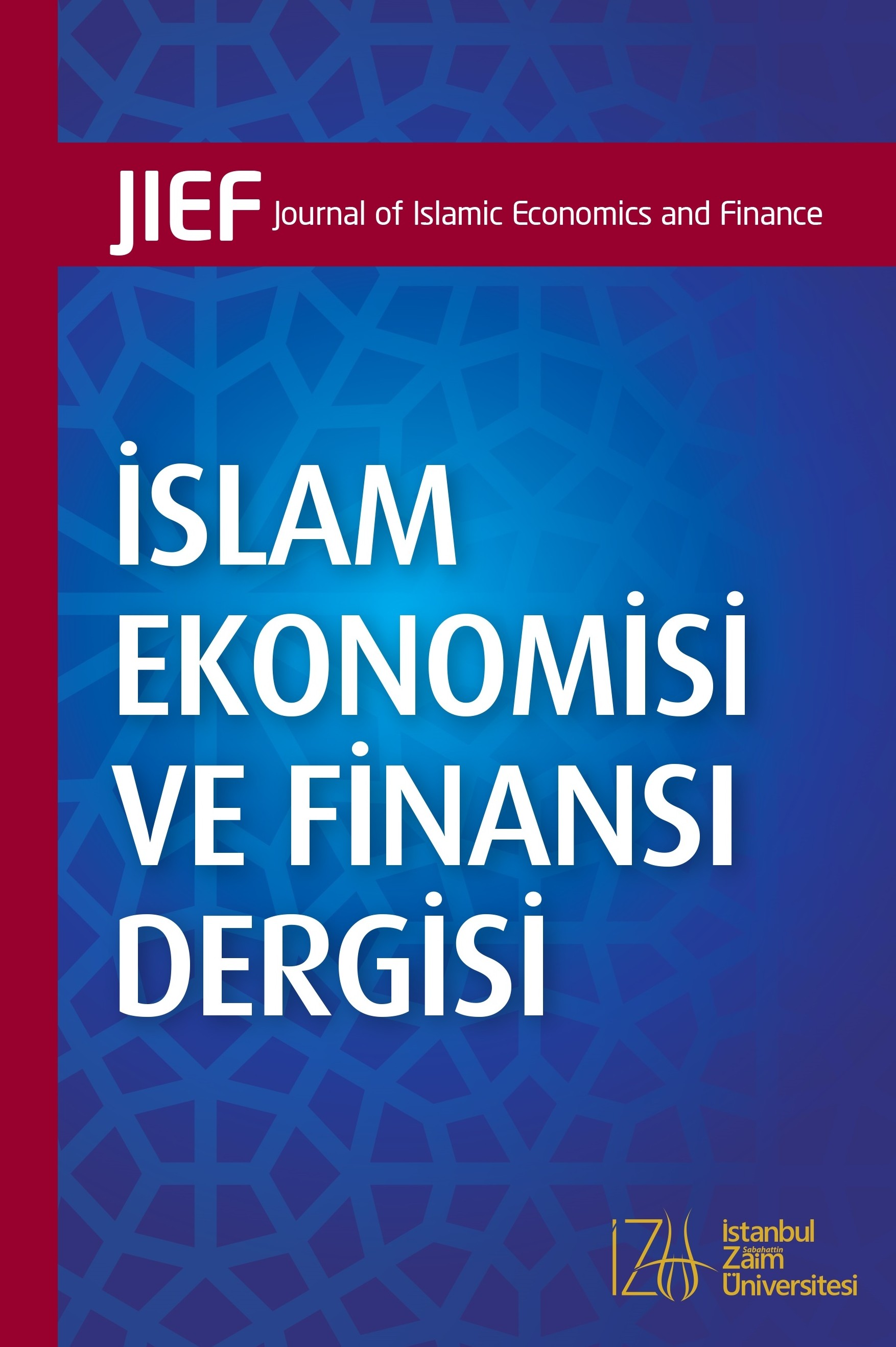İngiltere’de İslami Finans ve Bankacılık Alanında Yazılan Doktora Tezlerinin Bibliyometrik Analizi
Bibliometrik araştırma, İslam ekonomisi ve finansı alanında yayımlanan tez, belge ve raporların temel özelliklerini inceleyerek, bu alandaki bilimsel katkılara ilişkin çeşitli verilerin elde edilmesine yol açmaktadır. Doktora tezleri analiz edilerek, birey ve kurumların üretkenliği de ölçülebilir. Bu çalışmada İngiltere’de 2000'den 2018'e kadar yazılmış İslami bankacılık ve finans alanındaki tüm yüksek lisans tezleri (doktora), incelenmiştir. İncelenecek doktora tezleri, belirli arama kriterlerine dayanarak, İngiliz kütüphanesi veri tabanından belirlenmiştir. Bu çalışmanın amacı İngiltere’de İslami bankacılık ve finans alanında yazılan doktora tezlerini (unvan, yazar, cinsiyet, üniversite, ve doktora tezi sayıları açısından) incelemek ve bir yol haritası ortaya koymaktır. Elde edilen bulgulara göre, doktora tezlerinin yaklaşık% 71'inin erkekler tarafından yazıldığını, İngiltere’de yazılan tezlerin yaklaşık % 30'u Durham Üniversitesi’nde yazıldığı ve 2010 yılından itibaren İslami finans ve bankacılık alanında yazılan doktora tezlerinin sayısının hızla arttığı gözlenmiştir. Bu artışın nedenlerinden biri 2008 finansal krizinden sonra araştırma merkezlerinin ve üniversitelerin İslami finans ve bankacılık konusuna daha fazla yoğunlaşması gösterilebilir.
Anahtar Kelimeler:
İslami Bankacılık, İslami Finans, İngiltere, Bibliyometrik Analiz
Bibliometric Analysis of PhD Dissertations Written in Islamic Banking and Finance in the United Kingdom
By examining the specific characteristics of documents, theses and publications of Islamic economics and finance, the Bibliometric research leads to the acquisition of diverse data on scientific contributions in this field. By analyzing PhD dissertations data, the productivity of individuals and institutions can be measured. In this paper, all postgraduate dissertations (PhD) in the field of Islamic Banking and finance written in the United Kingdom have been analyzed since 2000 to 2018. Based on the specific search criteria, PhD dissertations were determined from the database of (British library) which leads to database of every university in the UK. Our goals to examine PhD dissertations and draw a general map of them in the field of Islamic Banking and Finance in the UK. In term of title, author gender, university, the year from 2000 to 2018 and the number of PhD dissertations. The paper found around 71% of PhD dissertations were by males which more than females. The number of PhD dissertations increased rapidly since 2010 and 2011, it might be resulted from the concentration of research centers and universities on the Islamic banking and finance after the financial crisis 2008. Also Durham University has the most theses among all of the universities by 30 % of all Islamic banking and finance theses in the UK
___
- Ainley, M. (2008) “Listing and Regulating Sukuk in the UK”, Sukuk Summit, June 25th, London HM Treasury & FSA, (2008) “Consultation on the legislative framework for the regulation of alternative finance investment bonds (Sukuk)”, The Treasury, London, UK.Ainley, M., Mashayekhi, A., Hicks, R., Rahman, A., & Ravalia, A. (2007). Islamic finance in the UK: Regulation and challenges. The Financial Services Authority (FSA), London.Belouafi, A., & Chachi, A. (2014). Islamic finance in the United Kingdom: factors behind its development and growth.British library https://ethos.bl.uk. Finney, R. and Matthew Sapte, M. (2009). “Treasury reclassifies Sukuk under new regime”. Available at: www.lexology.comFilippo di Mauro, Caristi, P. Couderc, S., Di Maria, A., Grewal, L., Masciantonio, S., Ongena, S., and Zaher, S. (2013) Islamic Finance in Europe, Occasional Paper Series, No. 146, European Central Bank.Global Islamic Finance Forum (GIFF). 2012. “Global Islamic Finance Industry”. Available at: www.giff.com.my.Jessop, N., & Bell, S. (2009). Islamic finance a key to London’s future prosperity. Tax Planning International Review: Special Supplement, 1(09).Harrison, M. (2018).Islamic finance and The UK. Gulf One Lancaster Centre for Economic Research Report. Lancaster University Management School, Lancashire.HM Treasury & FSA, (2008) “Consultation on the legislative framework for the regulation of alternative finance investment bonds (Sukuk)”, The Treasury, London, UK.HM Treasury & FSA, (2009) “Legislative framework for the regulation of alternative finance investment bonds (Sukuk): summary of responses”, the Treasury and the FSA, October 2009. Osborne, G. (2013). London can lead the world as an Islamic finance hub. The Financial Times.Ondes, T., Ahmid, A. F., & Faraj, A. (2019). Financial Performance of Islamic Banks in Turkey and the United Kingdom: A Comparative Study. European Scientific Journal, ESJ, 15(4), 87.Quilter-Pinner and Yan (2013). “Islamic Finance: foreign policy opportunities”, Foreign and Commonwealth Office. Available at:The Banker, (2013). “Islamic Finance in 2013”.UK Islamic Finance Secretariat (UKIFS), (2013). “UK, the Leading Centre for Islamic Finance”, the CityUK, October 2013, London.
- ISSN: 2149-3820
- Yayın Aralığı: Yılda 2 Sayı
- Başlangıç: 2015
- Yayıncı: İstanbul Sabahattin Zaim Üniversitesi
